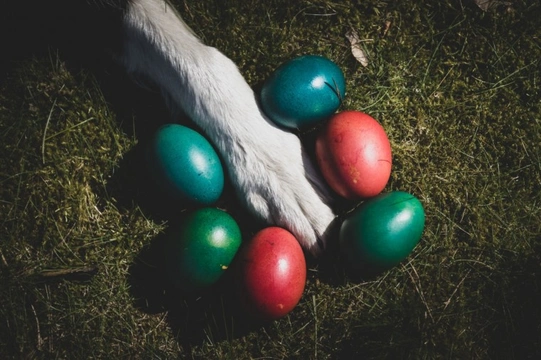
Can my dog have Easter eggs?
If you’re stocking up on Easter eggs for yourself or your children, you might be wondering if your dog can have an Easter egg too; but unless you buy an Easter egg designed for dogs and made of ingredients that are both safe for dogs and that dogs like, the answer to this is no.
Dogs can’t have Easter eggs – at least, not those made out of chocolate. Read on to learn why.
Can dogs eat Easter eggs?
No, dogs cannot eat Easter eggs. At least, not when we’re talking about what most of us think of as Easter eggs, being egg-shaped treats that are made of chocolate.
Chocolate is very poisonous to dogs, and in fact, it is not just one of the most acute food-based poisons for dogs but one that causes among the highest number of poisonings in dogs every year.
There are a range of reasons for this, the first being that we people as a whole love chocolate and tend to eat a lot of it and so, have it in the home all the time. The more ubiquitous something is, the easier it is for a dog to get hold of it, even if you’re careful; it is all too easy to leave an opened bar of chocolate on the arm of a chair for a moment thinking that the dog isn’t paying attention.
But where food is concerned, rest assured that the dog is always paying attention, and they could quite easily wolf the whole thing down, wrapper and all, in a matter of seconds!
The vast majority of dog owners already know that chocolate is poisonous to dogs and so that chocolate Easter eggs are poisonous to dogs; but knowing something and being able to action it is one thing. This is a particularly acute problem when it comes to teaching children, who may be too young to understand, don’t have the requisite attention span, or simply don’t or won’t listen, that chocolate is poisonous to dogs.
This effect becomes even more acute at Easter as there’s so much chocolate going around, and children tend to eat a lot of it and so their behaviour changes, and they’re excitable and also not as likely to pay attention to where their own chocolate is, as they have so much of it!
Dogs cannot have Easter eggs that are made of chocolate, and you should take extra care at Easter to ensure nobody gives your dog a piece of a chocolate egg thinking they’re being nice, and that your children don’t share their eggs with the dog or leave them in reach of the dog either.
What about other Easter sweets and treats?
Dogs can’t have any chocolate at Easter, which means the eggs themselves, chocolates that come in or with an Easter egg, or cakes and other treats containing chocolate either.
However, Easter is a time for eating sweet things in general, and chocolate is only the beginning of it; add in Easter cakes, hot cross buns, Simnel cake, and all sorts of other things and you might well wonder if there’s not something in there that your dog can actually share.
Sadly, there is not really, when it comes to sweet Easter foods anyway, they all contain something that is toxic to dogs or at least, a very poor match for their digestive systems.
Simnel cake and hot cross buns contain raisins and sultanas, which are poisonous to dogs, and most other sweet Easter foods contain chocolate in some shape or form.
Chocolate poisoning in dogs spikes sharply at Easter
The busiest time of the year in UK veterinary clinics when it comes to treating cases of chocolate poisoning in dogs is Christmas; followed closely by Easter (and then Valentine’s day) because all three of these times of year are times when chocolate is prolific, and our attentions are split, routines suspended, and behaviour (particularly of children) is often different.
Chocolate poisoning in dogs from Easter eggs tends to happen either because dogs got hold of unattended chocolate eggs, or because well-meaning children gave the dog chocolate eggs, or let the dog take it from them.
Are all Easter eggs poisonous to dogs?
Easter eggs that contain or are made with chocolate are all poisonous to dogs, but to different degrees. How dangerous eating a chocolate egg is for a dog depends on the size of the dog, how much chocolate they ate, and how much of the chocolate was made up of cocoa solids.
What Easter eggs are most dangerous to dogs?
Dark chocolate Easter eggs are the most dangerous for dogs, and the higher the level of cocoa solids (and so, the darker the chocolate) the more acute this is. Milk chocolate can still make dogs very ill, but is less strong than dark chocolate.
White chocolate, on the other hand, is likely to see most dogs that eat it getting a stomach upset from the richness of it if they ate a white chocolate egg, but otherwise probably getting away with it. White chocolate contains only trace amount of theobromine, the factor that causes chocolate to be poisonous to dogs.



